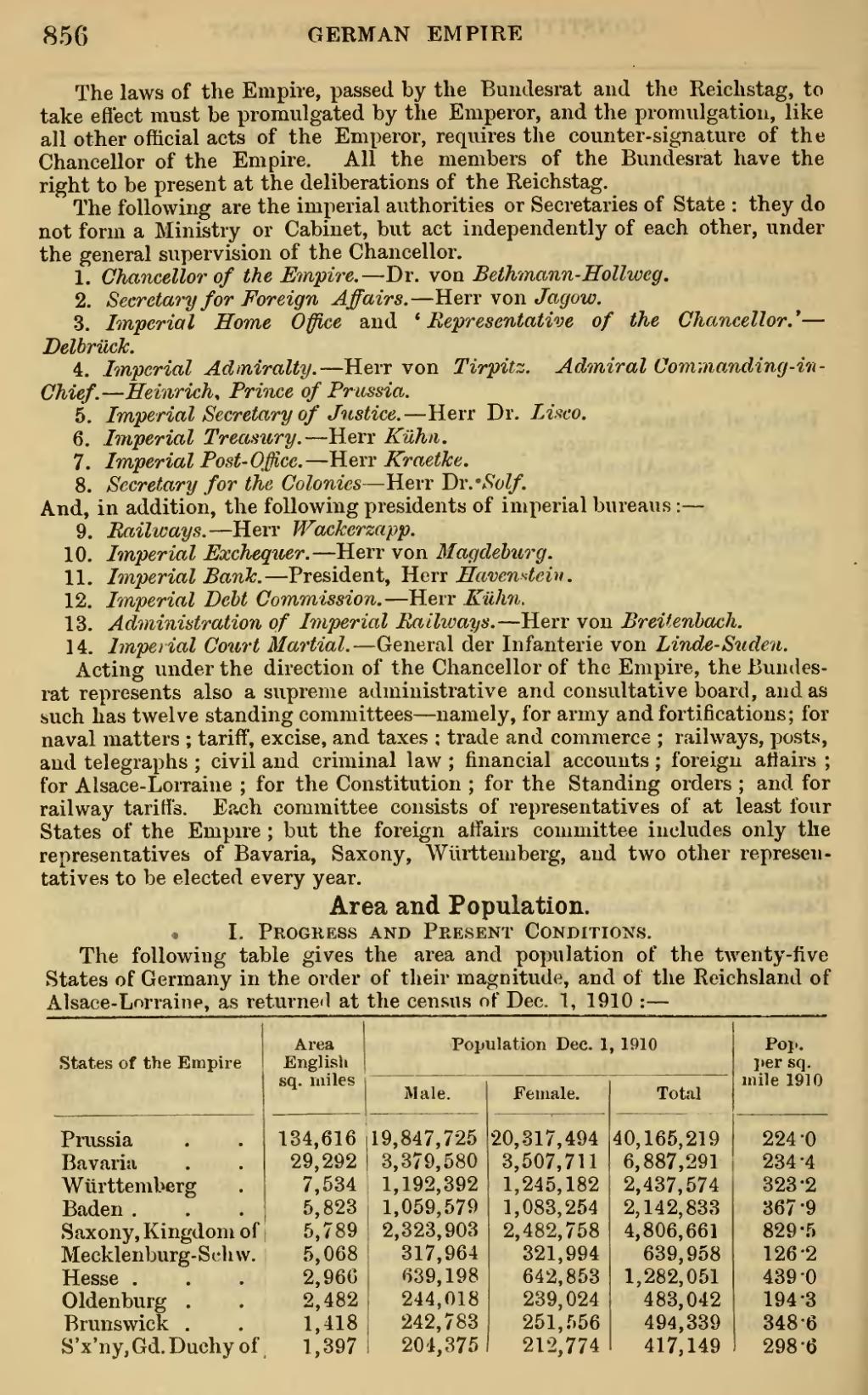856
GERMAN EMPIRE
The laws of the Empire, passed by the Bundesrat and the Reichstag, to take eflect must be promulgated by the Emperor, and the promulgation, like all other official acts of the Emperor, requires the counter-signature of the Chancellor of the Empire. All the members of the Bundesrat have the right to be present at the deliberations of the Reichstag.
The following are the imperial authorities or Secretaries of State : they do not form a Ministry or Cabinet, but act independently of each other, under the general supervision of the Chancellor.
1. Chancello?' of the Empire. — Dr. von Bethmann-Eollweg.
2. Secretary for Foreign Affairs. — Hqyy yon Jag ow.
3. Imperial Home Offlce and ^Representative of the Chancellor.' — Delbriick.
4. Imperial Admiralty. — Herr von Tirpitz. Admiral Commanding -in- Chief. — ffeinrich. Prince of Prussia.
5. Imperial Secretary of Justice. — Herr Dr. Lisco.
6. Imperial Treasury. — Herr Kiihn.
7. Imperial Post- Office. — Kevv Xraetke.
8. Secretary for the Colonies — Herr Dr.vS'oZ/.
And, in addition, the following presidents of imperial bureaus : —
9. Pail ways. — Herr JVackerzapp.
10. Imperial Exchequer. — Herr von Magdebtcrg.
11. Imperial Bank. — President, Herr Havendein.
12. Imperial Debt Commission. — Herr Kilhn.
13. Administration of Imperial Raihvays. — Herr von Breitenbach.
14. Imperial Court Martial. — General der Infanterie von Linde-Suden. Acting under the direction of the Chancellor of the Empire, the Bundes- rat represents also a supreme administrative and consultative board, and as such has twelve standing committees — namely, for army and fortifications; for naval matters ; tariff, excise, and taxes ; trade and commerce ; railways, posts, and telegraphs ; civil and criminal law ; financial accounts ; foreign atlairs ; for Alsace-Lorraine ; for the Constitution ; for the Standing orders ; and for railway tariffs. Each committee consists of representatives of at least four States of the Empire ; but the foreign affairs committee includes only the representatives of Bavaria, Saxony, Wiirttemberg, and two other represen- tatives to be elected every year.
Area and Population.
I. Progress and Present Conditions. The following table gives the area and population of the twenty-five States of Germany in the order of their magnitude, and of the Reichsland of Alsace-Lorraine, as returneil at the census of Dec. 1, 1910 : —
Area
Population Dec. 1, 1910
Pop.
States of the Empire
English sq. miles
per sq.
mile 1910
Jlale.
Female.
Total 40,165,219
Prussia
134,616
19,847,725
20,317,494
224-0
Bavaria
29,292
3,379,580
3,507,711
6,887,291
234-4
Wiirttemberg
7,534
1,192,392
1,245,182
2,437,574
323-2
Baden .
5,823
1,059,579
1,083,254
2,142,833
367-9
Saxony, Kingdom of
5,789
2,323,903
2,482,758
4,806,661
829-5
Mecklenburg-Schw.
5,068
317,964
321,994
639,958
126-2
Hesse .
2,966
639,198
642,853
1,282,051
439-0
Oldenburg .
2,482
244,018
239,024
483,042
194-3
Brunswick .
1,418
242,783
251,556
494,339
348-6
S'x'ny, Gd. Duchy of
1,397
204,375
212,774
417,149
298-6
